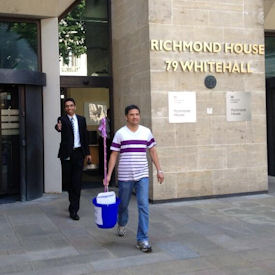Which ministers pay workers a London living wage?
A trophy for the best, a mop and bucket for the worst – campaigners go to Whitehall to expose which departments are paying workers a London living wage.
Without it, many workers say they can’t make it to the end of the month, worry constantly about money and even have to apply for benefits to make ends meet.
But ten of the major government departments still don’t pay all of their workers the London living wage of £8.55 an hour.
There is some good news for campaigners – since they began fighting on this issue last year, HM Treasury, the Department for Work and Pensions, the Supreme Court and the Prime Minister’s Office have all begun paying workers the London living wage.
In response, campaigners have presented them with a trophy.
We work hard to keep the offices of government clean but we are paid less than it costs to live. A letter from 35 cleaners to government ministers
But many – including the Deputy Prime Minister’s Office, the Department of Health, the Foreign Office and the Department for Environment, Food and Rural Affairs (DEFRA) – still do not. Earlier, these departments were given a mop and bucket emblazoned with “living wage” on the side.
The living wage differs from the national minimum wage of £6.19 for adults aged over 21 in that it is calculated on what workers need to live, with a London weighting because of the high cost of living in the capital. The minimum wage is worked out on what employers can afford to pay.
Read more on FactCheck: minimum wage vs living wage
‘Try harder’
A group of 35 cleaners, supported by Citizens UK, also delivered a letter to cabinet ministers asking them to “try harder” on the living wage.

The letter said: “We work hard to keep the offices of government clean but we are paid less than it costs to live. This means we have to make painful sacrifices like not spending time with our children because we take two buses and can’t afford to take the Tube.”
A league table published by Citizens UK highlighted DEFRA as the lowest payer of all, at just £6.19 an hour. The Department of Health came next, paying £6.32 an hour.
Kathy Rojas works as a cleaner at the Foreign Office, which pays £6.54 an hour.
“The living wage would make a big difference. I would be able to pay all my bills and stop getting housing benefits. I don’t like getting benefits because I work hard, but at the moment it’s impossible to do without…The living wage would help me become a little more free,” she said.
The departments who pay the living wage
HM Treasury: £8.55 an hour
Department for Work and Pensions: £8.55 an hour
Supreme Court: £8.55 an hour
Prime Minister's office: £8.55 an hour
The departments who do not
Department of Energy and Climate Change: £6.19 an hour (although have told campaigners they will change)
Department of Education: £7.90 an hour
Cabinet Office: £7.15 an hour
Deputy Prime Minister's Office: £7.15 an hour
Home Office: £7.15 an hour
Foreign and Commonwealth Office: £6.54 an hour
Ministry of Justice: £6.50 an hour
Department of Business, Innovation and Skills: £6.46 an hour
Department of Health: £6.32 an hour
Department for Environment, Food and Rural Affairs: £6.19 an hour
Source: Citizens UK
Some hope?
There is some hope for campaigners, with several departments telling Channel 4 News they are open to discussions on the living wage.
Lord Howe, health minister told Channel 4 News: “We understand the effect that low pay has on staff living in London. We have started discussions to encourage our suppliers to look at how they can improve the pay of the lowest paid members of staff. We are happy to meet with campaigners to discuss this in more detail.”

A Department for Business spokeswoman added: “Vince Cable takes this issue very seriously and has asked his officials to review the levels of pay and terms and conditions for the cleaners at BIS with a view to taking action where necessary.”
And Defra told us: A Defra spokesperson said: “Cleaners are employed directly by an external provider who pay the national minimum wage. The London living wage issue is currently under consideration.”
The living wage is not without its detractors: last year, the Institute for Economic Affairs (IEA) said that the proposals are “misguided” and could do more harm than good. The CBI also supports the minimum wage, rather than the living wage, because the former is balanced between giving workers a fair wage and ensuring that jobs are maintained.
However, it is already working for some. More than 100 organisations do currently pay the living wage in the public and private sectors, including KPMG, Save The Children and Birmingham City Council.
But campaigners say this is just the tip of the iceberg – and for the living wage to really take off, it is up to the government to lead the way.
-
Latest news
-
As India goes to the polls in the world’s largest election – what do British-Indians think?6m

-
Tees Valley: Meet the candidates in one of the biggest contests coming up in May’s local elections4m

-
Keir Starmer says public sector reform will be a struggle7m

-
Nicola Sturgeon’s husband Peter Murrell charged with embezzlement of funds from SNP1m

-
Ukraine might finally get $60billion in American weapons and assistance to defend against Russia3m

-




